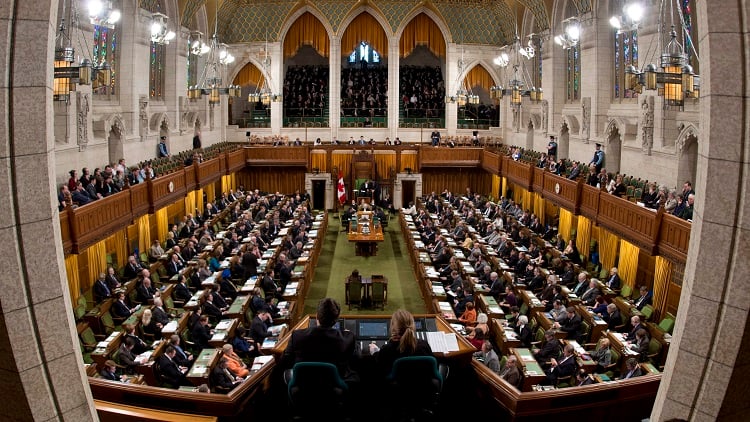
Last week, Jim Eglinski and Pat Perkins became the 4,215th and 4,216th individuals to rightfully claim a seat in the House of Commons when they officially took their oaths, signed the roll and became the MPs for the ridings of Yellowhead and Whitby-Oshawa respectively.
Shortly thereafter, they were each sent up to “ask” a “question” of the government.
Mr. Speaker, during the election campaign in my riding of Yellowhead, farmers came to me time and time again saying that they did not understand the policies of the Liberals and the NDP. They are stuck in the past holding on to antiquated ideas: grain monopolies that prohibit marketing freedom. I am proud to say to them that our government stands for the western Canadian grain sector. Could the Minister of Agriculture and Agri-Food please tell this House the latest measures our government is taking to modernize the grain sector?
Mr. Speaker, constituents in my riding of Whitby—Oshawa know that only our Conservative government will help Canadian families by putting their money back where it belongs—in their pockets. Can the Minister of Employment please update the House on the various measures our government has put in place to help families from coast to coast to coast?
The next day, Eglinski and Perkins rose during the 15 minutes reserved each day for MPs to stand and deliver a one-minute statement on a matter of local, provincial, national or international concern.
Mr. Eglinski went with this.
Mr. Speaker, law-abiding hunters, farmers and sport shooters know that there is only one party that will stand up for a safe and sensible firearms policy. It is not the Liberal party, whose leader said it would bring back the long-gun registry and makes claims about firearms laws that either show a deep cynicism or a fundamental misunderstanding of how the firearms laws work. It is not the NDP, who has committed to bringing back the gun registry and tracking every gun in Canada. It is our Conservative government. We have taken numerous actions to make our firearms policy safe and sensible. We ended the wasteful and ineffective long-gun registry once and for all, and introduced the common sense firearms act. We will always stand up for law-abiding hunters, farmers and sport shooters.
Ms. Perkins went with this.
Mr. Speaker, while Canada’s economy is better than many, and that is thanks to this government’s careful stewardship, we remain on the road to recovery. Introducing a carbon tax would be detrimental on this road to economic recovery. This government believes in the importance of a strong economy and refuses to weigh it down with another tax on Canadian families, contrary to the NDP and Liberals who have repeatedly called for increased taxes on Canadians. To bring in a job-killing carbon tax would be irresponsible. Our government is standing up for hard-working Canadians. Our Conservative government will never punish Canadians with the job killing carbon tax.
Now, I don’t mean to pick on these two new MPs. I’m sure Eglinski and Perkins are lovely people. I suspect they’re primarily here because they believe they can make a meaningful and positive contribution to the public affairs of this nation. In submitting themselves to the electoral process and winning public office, they have demonstrated admirable willingness and accomplished something truly impressive. But perhaps all of that should only make it more disappointing that these were their first contributions to the official record of the Parliament of Canada.
Now, we might imagine that in an ideal world that even the backbenchers of the governing party would use question period to seriously question the government about matters of topical concern—perhaps even speaking critically of the government’s efforts in some regard. (For the sake of a fun comparison, here is the question Brent Rathgeber asked last week.) But we might at least imagine that, even in the present less-than-ideal circumstance, the backbench MPs of the governing party could be able and willing to speak and act as something other than slavish adherents to and extensions of the party line.
Perkins, for instance, might’ve asked a question and made a statement about her concern for gridlock without either extolling the greatness of the government or lamenting the wickedness of the other parties.
Of course, every single member of the House is a partisan and they all act that way and in many ways they should act that way. If opposition MPs can be more easily forgiven their moments of slavishness it is only because they generally come closer to at least fulfilling the task of demanding accountability.
In its angriest and most simplistic excesses partisanship can be aggravating, but it’s the banal nothingness that is most dispiriting to witness. The scary possibility is that the repetitively recited talking point is actually a useful and wise approach to modern political communication, the most effective way of influencing a disinterested public in a situation that puts a premium on using every single opportunity to repeat the phrases you hope to imprint on the voter’s mind. The scariest possibility is that the repetitively recited talking point contributes—I’m just guessing, I can’t pretend to have any evidence of this—to the same public apathy it attempts to deal with.
It still does not seem like the best use of everyone’s time and energy for the hour between 2 p.m. and 3 p.m. each day in the House to be used for such stuff.